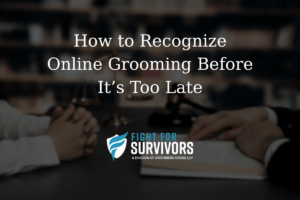
The internet has made it easier than ever for offenders to gain access to kids online, often under the guise of friendship or mentorship. Online grooming is a manipulative process where predators gain trust and establish a special relationship with young people to sexually abuse them. The dangers of child grooming are often hidden, making it difficult for parents, friends, and even a family member to recognize what’s happening.
Understanding the warning signs and knowing how to identify the tactics used by predators is critical in protecting children from online sexual abuse before it leads to offline abuse. This guide will help you spot the signs of grooming, recognize when a child is being groomed, and take action to report sexual abuse before lasting harm is done.

What Is Online Grooming?
Online grooming is a form of child sexual exploitation where an older child or much older person builds a close relationship with a potential victim using online platforms like social media, gaming sites, and chat rooms. The grooming process often follows a similar pattern where predators:
- Identify a vulnerable child – Often targeting those seeking attention, friendship, or emotional support.
- Establish trust – Pretending to be a caring relationship figure, such as a mentor, friend, or even a romantic interest.
- Gain control – Encouraging secrecy, isolating the child from parents and friends, and manipulating emotions.
- Introduce explicit content – Sending inappropriate messages or images to desensitize the child.
- Attempt sexual contact – Arranging meetings or coercing the child into actions they feel ashamed of.
Predators take time to groom children, sometimes over a long period, to make their victims feel special and dependent on them.
Warning Signs of Online Grooming
Spotting the warning signs early can prevent abuse. Here are key indicators that a child may be at risk:
- Spending more time online, especially on private chats or gaming platforms
- Becoming secretive about online relationships or avoiding discussing new friends
- Receiving unexplained gifts, money, or phone credit
- Changes in a child’s behavior, such as withdrawal, anger, or sudden mood swings
- Talking about an older friend or a special relationship with someone they’ve never met in person
- Having knowledge of sexual topics beyond what is appropriate for their age
- Being pressured to keep a relationship secret or lie to parents
- Displaying a need for more freedom and resisting parental boundaries
These signs do not always mean grooming is happening, but they should prompt parents or guardians to watch closely and talk to their child about their online interactions.
How Groomers Gain Trust and Control
Online groomers are skilled manipulators. They often gain a child’s trust by:
- Pretending to share the same age or interests
- Offering emotional support to a child who feels lonely or misunderstood
- Sending gifts or money to create a sense of obligation
- Making the child feel like they are in a caring relationship
- Encouraging secrecy by saying that parents or other adults won’t understand
The goal is to make the child dependent on them, leading to a situation where they can be exploited.
The Risks of Online Platforms
Contact Us For A Free Legal Consultation. No Fee.
Call (833) 55-FIGHTPredators use a wide range of online platforms to groom children. Social media, messaging apps, online chat rooms, and gaming communities are common places where offenders seek victims. These platforms allow direct and private communication, making it easier for predators to build relationships away from parental supervision.
Online platforms also enable offenders to target multiple children at once, making it crucial for parents to stay informed and involved in their child’s online life.
How to Protect Children from Online Grooming
Preventing online grooming starts with awareness and open communication. Here’s how parents and guardians can take action:
- Talk to your children – Regularly discuss online safety and the importance of personal boundaries.
- Monitor online activity – Keep an eye on the websites, apps, and games your child uses.
- Teach them to recognize grooming tactics – Help children identify suspicious behavior and inappropriate requests.
- Encourage openness – Make sure your child knows they can talk to you about anything without fear of punishment.
- Set privacy settings – Adjust online accounts to limit who can contact them.
- Report suspicious behavior – If you suspect grooming, report it to the authorities or child protection organizations immediately.

What to Do If a Child Has Been Groomed Online
If you discover that a child has been groomed online, take immediate steps to protect them:
- Stay calm – Your child may feel ashamed or afraid. Offer reassurance and support.
- Gather evidence – Save messages, images, and any interactions between the offender and the child.
- Report sexual abuse – Contact local law enforcement, cybercrime units, or child protection agencies.
- Seek professional help – Therapy and counseling can help a child recover from the trauma of abuse.
- Ensure online safety – Remove the offender’s access and review online security settings.
Final Thoughts
Online grooming is a serious crime that can have devastating effects on children and families. Recognizing the signs and understanding how predators operate is the first step in protecting children from harm. Parents, educators, and communities must work together to create safer online spaces and prevent child abuse before it happens.
If you suspect a child is being groomed online, take action immediately. Reporting abuse can prevent further harm and help protect other potential victims. Your vigilance and awareness could save a child’s life.
Frequently Asked Questions
How can I tell if my child is talking to a predator online?
Look for warning signs such as secretive behavior, unexplained gifts, changes in mood, or discussions about a special relationship with someone they’ve never met in person.
What should I do if I suspect online grooming?
Talk to your child, gather evidence, and report it to authorities. Do not confront the predator directly.
Are certain apps more dangerous for online grooming?
Any online platform with private messaging can be risky, including social media, chat apps, and gaming networks.
How can I teach my child to stay safe online?
Encourage open conversations, set privacy settings, and educate them about online dangers.
What legal actions can be taken against online groomers?
Online grooming is a serious crime in California, and offenders can face charges related to child sexual exploitation, abuse, and other cybercrimes. Authorities take reports seriously and can investigate these cases thoroughly.
If you’re concerned about online grooming, don’t wait. Take action today to protect the children in your life.
Experienced Attorneys Who Will Listen And Fight For You
Speak To An Attorney Now »